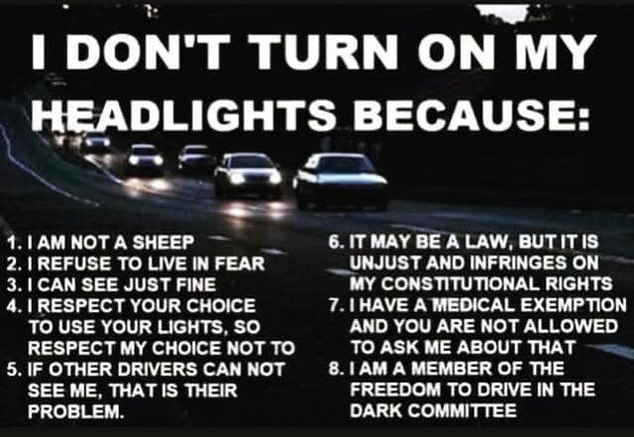Comments
-
Poll: (2020-) COVID-19 pandemicNote, this from a pre-print:
Massive randomized study is proof that surgical masks limit coronavirus spread, authors say (Sep 1, 2021)
You'll occasionally see someone not having their mask cover their nose, or otherwise not used quite right. I guess effectiveness depends on a few things, on some scale, not just (y) or (n). -
The Supremes and the New Texas Abortion Law"The unborn" are a convenient group of people to advocate for. They never make demands of you; they are morally uncomplicated, unlike the incarcerated, addicted, or the chronically poor; they don't resent your condescension or complain that you are not politically correct; unlike widows, they don't ask you to question patriarchy; unlike orphans, they don't need money, education, or childcare; unlike aliens, they don't bring all that racial, cultural, and religious baggage that you dislike; they allow you to feel good about yourself without any work at creating or maintaining relationships; and when they are born, you can forget about them, because they cease to be unborn. It's almost as if, by being born, they have died to you. You can love the unborn and advocate for them without substantially challenging your own wealth, power, or privilege, without re-imagining social structures, apologizing, or making reparations to anyone. They are, in short, the perfect people to love if you want to claim you love Jesus but actually dislike people who breathe.
Prisoners? Immigrants? The sick? The poor? Widows? Orphans? All the groups that are specifically mentioned in the Bible? They all get thrown under the bus for the unborn. — Dave Barnhart (2018)
I have a feeling many females I know would look into moving if living in Texas. -
Can nonexistence exist? A curious new angle for which to argue for God's existence?From physicists (including Krauss) we might expect ...
◾ The Four Different Meanings Of 'Nothing' To A Scientist (Ethan Siegel; Forbes; May 1, 2020)
• a condition where the raw ingredients to create your "something" didn't exist
• nothingness is the void of empty space
• nothingness as the ideal lowest-energy state possible for spacetime
• nothingness only occurs when you remove the entire universe and the laws that govern it
From (some) philosophers we might expect "nothingness" to express (exhaustive) absence of everything/anything (i.e. by negation), like the missing complement to existence, in some cases anyway. Oddly enough perhaps, this also implies absence of constraints, conservation (physics), etc. Not much to speak of it seems.
◾ Nothingness (Roy Sorensen; Stanford Encyclopedia of Philosophy; Aug 31, 2017)
More colloquially we might say something like "there's nothing in the drawer", meaning it's empty, ready to be filled. Different from the other uses.
The gospel of anonymous. ¹ Once upon a time there were wobbly relativistic quantum fields, and time was more spacelike. ² Asymptotically, a condition was reached whereby symmetry-breaking and positive expansion came to be. ³ And so the humble beginnings of our universe emerged from edge-free primordial nature.
The variety/ambiguity is best avoided I guess. So, what are talking here anyway?

-
Poll: (2020-) COVID-19 pandemic, I guess practices vary.
Around here eligibility was/is advertised, by age way back when. You then sign up online/over phone, read/get instructions (allergies, symptoms, conditions, mask up, the usual), pick a free slot (location, 4m each). Arrive at location observing protocols (distance, the usual), show health card to get your slot (plus short questionnaire again, symptoms, whatever), stay at assigned spot until called, get called in (couple quick questions yet again), disinfectant, shot plus bandaid, told to wait in designated area for 15m (some nurses or whatever are around), leave. Go back online to where you signed up, print out receipt (registered vaccination(s)), also has known symptoms and whatever to look out for once again. Done, go on about your business.
I think that was about it for us, not really that much to it, like assembly lines. That's Atlantic Canada. Done similarly in Denmark.
Pathogens and outbreaks aren't exactly new. Life is lethal. Make the best of it, together.
One concern that's come up is back-to-school. Kids aren't eligible for vaccination. -
The Supremes and the New Texas Abortion LawHere's a quick shoot-out 21st Century solution. — Amity
This just scrolled by elsewhere ... :)
https://twitter.com/mmpadellan/status/1433416836960464898 -
Poll: (2020-) COVID-19 pandemic@Isaac, scouring back over comments, I see you want to make a comparative argument — Harley Davidson, obesity, ... That's all fine, I suppose.
Meanwhile, we still have to deal with the damn pandemic.
The simple part is that more or less everyone wants the damn pandemic to be gone, to a reasonable extent, and so sensible people follow protocols to do theirs in whatever ways (mask, sanitize, distance, etc). Vaccinations are a great step forward. — jorndoe
The mutative nature of SARS-CoV-2 doesn't help. Rhetoric and influential celebrities dishing out poor/irresponsible/unqualified (pseudo)advice doesn't help. Inciting fear/panic doesn't help.
...
Vaccinations (and commonsensical precautions) do.
• Number of COVID-19 cases not as concerning as hospital admissions, says Dr. Nathanson (Sep 2, 2021)
-
Poll: (2020-) COVID-19 pandemic, that was how I read it, but may have to re-read, after a cup of coffee, some other day.
Says "in the same population", and 19.6M AstraZeneca + 9.5M Pfizer = 29.1M vaccinated, with 1.8M infected. I think. So, all 29.1M had 1 vaccination, and 1.8M out of those were infected, i.e. 27.3M uninfected. And then something in the range of 10 times more cases of clotting for the infected.
But it's not entirely clear. The paper says (in ever so many words) that there's an increased risk of clotting shortly after the 1st vaccination (albeit small) without clarifying what the comparison here is. I guess it's assumed the unvaccinated uninfected has no or insignificant cases of clotting. Or something.
There's a whole lot of stuff about the timing, which might be of some relevance as well.
In summary, infection ups chances of clotting noticeably. -
Poll: (2020-) COVID-19 pandemic1 Pfizer vaccination, female, 17 years old, oxygen drop, blood clot, various symptoms:
Welsh teen in hospital with Covid targeted online by anti-vaxxers (Aug 31, 2021)
(y)
By the way, some concerns about pregnancy have been raised. Don't know current status, can't keep up with it all, workday tomorrow.
Is exactly an answer to it — Isaac
Nay, just running with your narrative. (Sorry, not going repeat.)
Questionable humor? A grumpy ol' philosopher I know out Ohio way, that spends much time dishing out grades (correlates with grumpy?), posted this one... :)

-
Poll: (2020-) COVID-19 pandemicThat was my response. The 'deniers' are not a homogeneous legion so are not either guilty or not as one entity. — Isaac
Except it wasn't a response to the inquiry posed. (n)
Just FYI, I'm not likely to change topics in the middle of this topic (e.g. two wrongs don't make a right). You'll have to open a new post for that. (y) -
Poll: (2020-) COVID-19 pandemicBrief update on risks ...
Original paper: Risk of thrombocytopenia and thromboembolism after covid-19 vaccination and SARS-CoV-2 positive testing: self-controlled case series study (Aug 27, 2021)
News article: Blood clot risk greater after Covid infection than after vaccination (Aug 27, 2021) -
Poll: (2020-) COVID-19 pandemicnot one homogeneous legion — Isaac
Right, and that wasn't claimed, except there are a few influential voices operating against ...
The simple part is that more or less everyone wants the damn pandemic to be gone, to a reasonable extent, and so sensible people follow protocols to do theirs in whatever ways (mask, sanitize, distance, etc). Vaccinations are a great step forward. — jorndoe
... hence asking ...
I suppose we might then ask who, if any, ain't doing theirs? Say, are deniers, contrarians, distrust-spreaders, dissidents, conspiracy theorists, etc, guilty in some sense? Failure to learn from history? — jorndoe
... which you failed to respond to for some reason.
Forgot to ask if you voted. Please do. (y)
• Psychosocial and demographic characteristics relating to vaccine attitudes in Australia (Aug 21, 2018)
• Naomi Oreskes: ‘Discrediting science is a political strategy’ (Aug 21, 2018)
• Religious affiliation and COVID-19-related mortality: a retrospective cohort study of prelockdown and postlockdown risks in England and Wales (Jan 6, 2021)
• How Capitalist Competition Hobbled the COVID-19 Vaccine Rollout (Jan 6, 2021)
• Which US demographics are more likely to refuse a COVID-19 vaccine? (Jan 11, 2021)
• Persuasion, not coercion or incentivisation, is the best means of promoting COVID-19 vaccination (Jan 26, 2021)
• Education is a bigger factor than race in desire for COVID-19 vaccine (Feb 25, 2021)
• Negative Affectivity, Authoritarianism, and Anxiety of Infection Explain Early Maladjusted Behavior During the COVID-19 Outbreak (Feb 25, 2021)
• COVID-19 vaccine hesitancy and resistance: Correlates in a nationally representative longitudinal survey of the Australian population (Mar 24, 2021)
• New Tool Tracks Vaccination and Vaccine Hesitancy Rates Across Geographies, Population Groups (Apr 14, 2021)
• COVID-19 Vaccine Hesitancy: Demographic Factors, Geographic Patterns, and Changes Over Time (May 19, 2021)
• Predictors of COVID-19 Vaccine Hesitancy: Socio-Demographics, Co-Morbidity, and Past Experience of Racial Discrimination (May 27, 2021)
• KFF COVID-19 Vaccine Monitor: Profile Of The Unvaccinated (Jun 11, 2021)
• SARS-CoV-2 Delta VOC in Scotland: demographics, risk of hospital admission, and vaccine effectiveness (Jun 14, 2021)
• Alberta's COVID-19 vaccination rates tied to levels of formal education, data shows (Jun 15, 2021)
• COVID-19 Vaccine Hesitancy in a Representative Education Sector Population in Qatar (Jun 18, 2021)
• Biden didn't "fall short" of July 4 vaccination goal — he was sabotaged by Republican trolls (Jul 6, 2021)
• EDITORIAL: Vaccine hesitancy cuts across many demographics (Jul 20, 2021)
• As White Evangelical Vaccine Refusal Reminds Us, Sometimes Religion is the Problem (Jul 29, 2021)
• Companies mulling charging unvaccinated employees more for health coverage: report (Aug 14, 2021)
• NBC News poll shows demographic breakdown of the vaccinated in the U.S. (Aug 24, 2021)
-
Poll: (2020-) COVID-19 pandemicThe simple part is that more or less everyone wants the damn pandemic to be gone, to a reasonable extent, and so sensible people follow protocols to do theirs in whatever ways (mask, sanitize, distance, etc). Vaccinations are a great step forward. Mutations (and the pathogens continuing to find fertile grounds) make for a more bumpy road.
I suppose we might then ask who, if any, ain't doing theirs? Say, are deniers, contrarians, distrust-spreaders, dissidents, conspiracy theorists, etc, guilty in some sense? Failure to learn from history?
• Who are the anti-vaxxers? Here's what we know — and how they got there in the first place (Mar 27, 2019)
• After Truth: Disinformation and the Cost of Fake News (Mar 19, 2020)
• From students to politicians, many smart people have fallen for dangerous lies spread about the new coronavirus. Why? And how can you protect yourself from misinformation? (Apr 6, 2020)
• Study Finds More COVID-19 Cases Among Viewers Of Fox News Host Who Downplayed Pandemic (May 4, 2020)
• The Anti-Vaccine Movement in 2020 (May 22, 2020)
• The pandemic exposes human nature: 10 evolutionary insights (Jun 9, 2020)
• The Masks Masquerade (Jun 14, 2020)
• Mistrust of the medical profession and higher disgust sensitivity predict parental vaccine hesitancy (Sep 2, 2020)
• Many COVID-19 patients insist ‘it’s not real’ until they die, nurse says (Nov 17, 2020)
• 15 Infuriating Stories About Doctors Who Had To Diagnose A COVID-19 Denier With The Coronavirus (Apr 21, 2021)
• States with low vaccination numbers had Covid-19 case rates last week 3 times higher than others where people are fully vaccinated (Jul 12, 2021)
• The YouTubers who blew the whistle on an anti-vax plot (Jul 25, 2021)
• White Evangelicals Resist Covid-19 Vaccine Most Among Religious Groups (Jul 28, 2021)
• Ben Shapiro’s Advice for Resisting America’s ‘Authoritarian Moment’ (Aug 2, 2021)
• CNN tracked down a super-spreader of Covid-19 misinformation. See how he reacted (Aug 5, 2021)
• Unvaccinated adults driving COVID-19 case increase in Canada (Aug 10, 2021)
• This Woman Secretly Runs One of the World's Biggest Anti-Vax Websites From Her House (Aug 12, 2021)
• Why the Church Keeps Getting Covid Wrong (Aug 16, 2021)
• Parent rips face mask off teacher in confrontation at school, Texas district says (Aug 17, 2021)
• Covid-19: Lockdown not enough to stop Australia’s delta variant crisis (Aug 17, 2021)
• Anti-Vaxxers Go Off the Rails at San Diego County Meeting: ‘Heil Fauci’ (Aug 17, 2021)
• An Alabama doctor watched patients reject the coronavirus vaccine. Now he’s refusing to treat them. (Aug 18, 2021)
• The FDA Is Begging You Not to Take Horse Dewormer for Covid-19 (Aug 21, 2021)
• Almost 5,000 Covid cases linked to Cornish music and surf festival (Aug 23, 2021)
-
Poll: (2020-) COVID-19 pandemicbut the second shot rolled her socks for 18 hours and she thought she was going to die — James Riley
Right, yeah, the day-after-downtime is common enough I think, often after the 2nd vaccination. It's usually advertised by those administering the vaccinations. -
Poll: (2020-) COVID-19 pandemicAnd no consideration is given as to why a person didn't get vaccinated — baker
Maybe, maybe not? What do you think? It's usually easy enough to identify people that require special medical attention. (Maybe ridiculous conspiracy theories are special conditions.) Actually, I think trying to round up medical conditions is standard procedure; maybe @frank or someone knows.
somehow, covid vaccines are a stellar exemption — baker
Keep up. Some known suspects include allergy, blood clotting, adverse reactions in some children. But, saying "hey, it works, which can't be right" doesn't work.
I guess @NOS4A2 had nothing to say on the topic. :-/ -
Poll: (2020-) COVID-19 pandemicDo you believe hospitals should deny people healthcare because they are unvaccinated? — NOS4A2
Me personally? Well, no, but that's irrelevant, and still wasn't the question.
The board of hospitals decides that ...
The one vaccinated gets the one bed left, in priority over the other who deliberately chose not to be vaccinated (and may have to be isolated in a hallway, sent home, or whatever) — jorndoeFor/against then? — jorndoe
Not quite a trolley problem, see earlier comments.
There are examples of hospitals running full, and this is a possibly extreme example given earlier:
-
Poll: (2020-) COVID-19 pandemic, I guess we're talking past each other.
unvaccinated infected (majority, ↓ priority) ≠ vaccinated infected (minority, ↑ priority) -
Poll: (2020-) COVID-19 pandemic
-
Poll: (2020-) COVID-19 pandemicI'm not against that. I'm against governments forcing people to do that. — NOS4A2
Scale it up.
The board of hospitals makes such a decision.
For/against then? (anti-government rhetoric aside) -
Poll: (2020-) COVID-19 pandemic1. You don't have time to deal with any of this — frank
Right, when things are happening, there's no time to waste, including checking whether an incoming person is un/vaccinated.
That being said, @Benkei's point seems fair enough.
(Not that it matters, personally, I can see why, seems a fair consequence, though I haven't worked out if my conscience can run with that.)
The one vaccinated gets the one bed left, in priority over the other who deliberately chose not to be vaccinated (and may have to be isolated in a hallway, sent home, or whatever).
Regardless of whatever analogies, such considerations are still on the table.
Georgia cop who pushed people to take horse dewormer instead of vaccine dies from COVID-19 (Aug 27, 2021) -
Poll: (2020-) COVID-19 pandemicVehemently against — NOS4A2
Quick follow-up, FMI.
Suppose a family had decided not to let unvaccinated (or untested / unmasked / not following protocols) into their home.
Would you be against that?
(I mean, not so much a matter of "it's their choice in their own home", but in terms of reasons for being "Vehemently against") -
Poll: (2020-) COVID-19 pandemicMy impression is that many places, like (elementary) schools and military, have used "vaccine passports" of some sort for a long time.
Don't have numbers though, but it does make some sense, doesn't it?

-
Anti-vaccination: Is it right?Head over to this parallel post ⇒ Poll: (2020-) COVID-19 pandemic ⇐ hit some buttons (y) (n) and let's see what the forum members think at large.
A Jan-Jun 2021 probe somewhere out there ...

... via KFF COVID-19 Vaccine Monitor: In Their Own Words, Six Months Later (Jul 13, 2021) -
Anti-vaccination: Is it right?I'm seeing some accusations of hypocrisy (double standards) here, while at the same time committing a two-wrongs-make-a-right fallacy. :meh:
-
CoronavirusHead over to this parallel post ⇒ Poll: (2020-) COVID-19 pandemic ⇐ hit some buttons (y) (n) and let's see what the forum members think at large.
A Jan-Jun 2021 probe somewhere out there ...

... via KFF COVID-19 Vaccine Monitor: In Their Own Words, Six Months Later (Jul 13, 2021) -
Poll: (2020-) COVID-19 pandemicQuestion 3 in full, since it appears to be truncated:
Mandatory vaccination (or frequent testing) in some settings (e.g. packed offices, schools, hospitals) -
CoronavirusSorry , I may play your games some other time.
FYI, here are a couple reports that may or may not support some of your assertions:
Conscientious vaccination exemptions in kindergarten to eighth-grade children across Texas schools from 2012 to 2018: A regression analysis (Mar 10, 2020)
Mistrust of the medical profession and higher disgust sensitivity predict parental vaccine hesitancy (Sep 2, 2020)
They're a bit early for the current pandemic I suppose. -
CoronavirusJust if it wasn't clear, in this context, speaking of harmless/harmful isn't the same as when speaking of Dihydrogen Monoxide. — jorndoe
Largest real-world study of COVID-19 vaccine safety published (Aug 26, 2021)
, the comment was explicitly using broader categories:
Yeah, most reports show that more education and vaccine acceptance (less education and vaccine hesitance) correlate.
The delimiters are typically high school and college, and far from all are done with detailed rigor and checks.
(Seems biased to dismiss those reports.)
Granted, you can find some that show differently than that, though they're a minority.
People having changed their minds almost always go from hesitance to acceptance.
Some reports suggest a "hard core" that never change their minds.
(In different areas, incorrigibility seems correlated with radical/extreme views.)
One report found that fear of side effects was the most common reason for hesitance. — jorndoe -
Coronavirus
-
Coronavirusprophylactic medicine — Isaac
Just if it wasn't clear, in this context, speaking of harmless/harmful isn't the same as when speaking of Dihydrogen Monoxide. -
CoronavirusI'm seeing some accusations of hypocrisy here, while at the same time committing a two-wrongs-make-a-right fallacy.
The PhD hesitancy rate is curious — Hanover
Yeah, most reports show that more education and vaccine acceptance (less education and vaccine hesitance) correlate.
The delimiters are typically high school and college, and far from all are done with detailed rigor and checks.
(Seems biased to dismiss those reports.)
Granted, you can find some that show differently than that, though they're a minority.
People having changed their minds almost always go from hesitance to acceptance.
Some reports suggest a "hard core" that never change their minds.
(In different areas, incorrigibility seems correlated with radical/extreme views.)
One report found that fear of side effects was the most common reason for hesitance. -
Anti-vaccination: Is it right?:D
God hates masks. They violate the first commandment which is to remember his glory. And what is more glorious than his image which is reflected in man, who he made in that glorious image. God wants his full image on full display. That little drape of cloth that covers the expression of his image casts the world into darkness. — Kyle D MallesterResurrection School students took the message to heart, many of them showing up naked for classes the next day. — Phillip T Stephens
Catholic School Opens Nudity Door (Jul 22, 2021)
At press time, Ackrite refused to answer whether or not she had emptied her bowels on the living room floor, arguing that her refusal to divulge such information was protected by the courts.
Toddler Cites Freedom Of Choice In Refusal To Use Potty (Aug 11, 2021) -
Anti-vaccination: Is it right?honesty — frank
... matters. (y)
There's no interest in persuasion here at all, nothing but pious flag-waiving - if people seriously wanted to convince others to vaccinate, they might want to consider carefully presenting the scientific evidence on risk, or addressing the moral arguments on responsibility, rather than chanting like a bunch of football hooligans. — Isaac
The information is available, there's just no accounting for stupidity, and mis/dis/mal-information.
What has knowing 'some stuff' got to do with a claim that the vaccine is harmless and the virus not? Your own citation outlines the very uncertainty I referenced. — Isaac
Already clarified once, here "harmless" isn't the same as "something you never interact with", suspects listed included allergy, blood clotting, adverse reactions in some children. Not playing a semantics game where you decontextualize and seemingly pretend to not understand.
Your defensiveness betrays your lack of confidence — Isaac
Mind-reading? Bullshit again. (not that it matters, but most people around here, including me, have been double-vaccinated)
entitled to take risks — Isaac
You're entitled to think you can fly and safely jump off a skyscraper, and that governments have crafted mind-control with vaccines. I don't think there's any particular law against stupidity, and that's what father and son were - stupid. Emphasized now if it wasn't clear in the original comment:
I guess ... something ... runs in that family. — jorndoe
Is it worthwhile repeating what others have already pointed out?
Placing myself at risk is one thing. Placing others at risk is another. — James Riley
Some have just had it with the seemingly endless conspiracy theories and ignorance.
• How Typhoid Mary left a trail of scandal and death (Apr 20, 2020) - history is a fine teacher
• Study Finds More COVID-19 Cases Among Viewers Of Fox News Host Who Downplayed Pandemic (May 4, 2020)
• Their Patients Have COVID-19 and Still Think It’s a Hoax - Nurses treating coronavirus skeptics are being spit on and harassed. Many want to quit. (Nov 25, 2020)
• Persuasion, not coercion or incentivisation, is the best means of promoting COVID-19 vaccination (Jan 26, 2021)
• 15 Infuriating Stories About Doctors Who Had To Diagnose A COVID-19 Denier With The Coronavirus (Apr 21, 2021)
• The YouTubers who blew the whistle on an anti-vax plot (Jul 25, 2021)
• The vaccinated are angry. That's understandable but unproductive, health experts say (Aug 8, 2021)
• Vaccine Outrage: Why the Delta Variant’s ‘Sudden Doom Effect’ Is Making Us Snap (Aug 10, 2021)
• Companies mulling charging unvaccinated employees more for health coverage: report (Aug 14, 2021) - I suppose this was to be expected eventually
• Parent rips face mask off teacher in confrontation at school, Texas district says (Aug 19, 2021) - let them cool off behind bars for a bit with drug dealers
• An Alabama doctor watched patients reject the coronavirus vaccine. Now he’s refusing to treat them. (Aug 18, 2021) - maybe a bit heavyhanded but making a point
-
Anti-vaccination: Is it right?, would you have me clarify something like, yes, life is lethal, but that's not what I meant?
suggests lack of proportional senseThere's no magic :sparkle: spell
Maybe a quick overview of some related history would be worthwhile? Typhoid Mary? The 1918 flu pandemic? Sentiments like some of those expressed here aren't particularly new. History is a fine teacher, has an odd way of repeating itself.
Whatever 2021 reports ...
• COVID-19 Vaccines Work. Here’s the Real-World Proof (Feb 24, 2021)
• One Year After Coronavirus Pandemic Declared, How Many Deaths From Covid-19? (Mar 13, 2021)
• Researchers are closing in on long covid (Apr 29, 2021)
• Impact of vaccination on new SARS-CoV-2 infections in the United Kingdom (Jun 9, 2021)
• SARS-CoV-2 Delta VOC in Scotland: demographics, risk of hospital admission, and vaccine effectiveness (Jun 26, 2021)
• States with low vaccination numbers had Covid-19 case rates last week 3 times higher than others where people are fully vaccinated (Jul 12, 2021)
• 'The sky is not falling': Provincetown outbreak shows vaccines work, even against Delta (Jul 30, 2021)
• Natural infection isn't enough to protect against COVID-19, experts say. You still need a vaccine. (Aug 11, 2021)
• San Diego County Covid-19 hospitalizations. (Aug 12, 2021)
• Confirmed Cases of COVID-19 Following Vaccination in Ontario: December 14, 2020 to August 7, 2021 (Aug 16, 2021)
• Vaccinations Against COVID-19 May Have Averted Up To 140,000 Deaths In The United States (Aug 18, 2021)
-
Anti-vaccination: Is it right?Whats the big deal here? If you want it take it. If you dont dont take it. — Prishon
I guess it's a social thing. Not the same as pizza with pineapple. There are social consequences to take into account as well.

-
Anti-vaccination: Is it right?That's not true unfortunately. There are risks. — frank
Well, yes, everyone already knows. Minimal. Don't have numbers handy, but suspect stupidity have those risks outdone. (By the way, whenever we've had flu shots in the past, one of the questions was always about allergies.)
• Suspicions grow that nanoparticles in Pfizer’s COVID-19 vaccine trigger rare allergic reactions (Dec 21, 2020)
• COVID-19 Vaccines: 6 Vaccine Myths Explained (Mar 8, 2021)
• Teen boy dies a few days after receiving second COVID vaccine shot (Jun 26, 2021)
• Three things to know about the long-term side effects of COVID vaccines (Jul 6, 2021)
• BLOOD CLOTTING, COVID-19 AND VACCINES (Jul 7, 2021)
• The Johnson & Johnson Vaccine and Blood Clots: What You Need to Know (Aug 4, 2021)
What a ridiculous thing to say — Isaac
Nah, it ain't. Comment ↑ suggests lack of proportional sense. :eyes: We already know some stuff.
• Children with long covid (Feb 27, 2021)
• When will children under 12 be vaccinated against COVID-19? (Jul 6, 2021)
• Should children get COVID vaccines? What the science says (Jul 20, 2021)
they chose to try and do without prophylactic medicine — Isaac
They were conspiracy theorists thinking in terms of mind control or whatever ridiculous nonsense. Now they're dead. :death: RIP.
conflicts with WHO advice — Isaac
Already spoke to risks. There's no magic :sparkle: spell. Everyone already knows, including WHO.
I call bullshit :point: @Isaac -
Anti-vaccination: Is it right?, the vaccine is harmless, the virus ain't, and apparently conspiracy theories (and certain religious faiths) ain't either. The father and son could have lived on to be stupid another day, but chose (the "rush" of) drowning in their own blood. (Worth it? Not according to their family.)
That’s where he [the son] died of COVID on August 3 – never getting the vaccine because he thought it was a government conspiracy. Now, she’s [the wife of the dead son is] pleading with the public to get the vaccine. After Stevenson’s death on August 3, one of his sons who was also choosing to not get vaccinated, finally went and got the shot. — Kaitor Kay/KFOR
As an aside, someone wrote a piece comparing the deniers with various cults. Where the included cults could be characterized as suicide cults, the deniers were more like a homicide cult. A tad hyperbolic, but I can see their argument. Detroiter Jason Hargrove ain't forgotten. RIP.
The deniers are fertile ground for the virus to "live on", spread mutate kill, much to the frustration of medical workers. -
Anti-vaccination: Is it right?same with motorsports — Isaac
Some just can't get enough rush from virus infections...? -
Anti-vaccination: Is it right?Man refused to get vaccinated even after his own father died of COVID – now he’s dead from COVID too (Aug 19, 2021)
I guess ... something ... runs in that family.
jorndoe

Start FollowingSend a Message
- Other sites we like
- Social media
- Terms of Service
- Sign In
- Created with PlushForums
- © 2026 The Philosophy Forum



